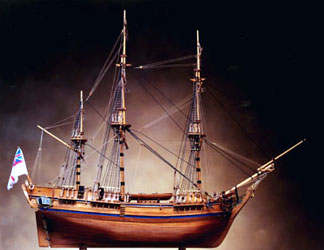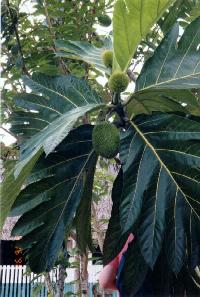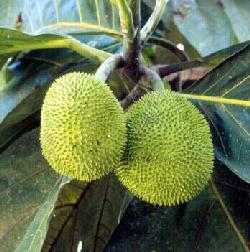|
While most of us don't live in paradise, we do dream of an idyllic place far away from our real world filled with terrorism, recession, and drugs. Captivated by the quest for heaven on Earth, I read many of the novels written about this human need for utopia. One of the most interesting of these stories is the Mutiny on the Bounty. The British government commissioned Captain Bligh to bring back breadfruit plants to Jamaica. They want to cut down on the costs of feeding slaves on their Jamaican sugar plantations. 
H.M.S. Bounty Captain Cook and other British explorers reported on a large fruit that looked like a potato but was the size of a human head and called breadfruit. These plants were found throughout the islands of the South Pacific. Pictures provided by Dr. Jim Castner and Joe Baze. For more information, see the book, "Field Guide to Medicinal And Useful Plants of the Upper Amazon." Off sailed Bligh to bring back a boatload of breadfruit plants. However, the HMS Bounty ran into a horrible storm off Cape Horn. The storm resulted in not getting to the South Pacific in time to transplant and then transport the plants back to Jamaica. Therefore, Bligh, whose talents didn't lie in good interpersonal communication skills, had to layover for nearly a half year in Tahiti waiting for the right time to uproot the breadfruit. Many of his sailors grew content with the easy life in paradise. When the time came to leave with the Bounty bulging with 1015 breadfruit plants, they were not keen on returning to life on the sea. As a result, a mutiny ensued on April 28, 1789 just off Tonga. Bligh's trusted lieutenant, Fletcher Christian, led the mutineers. Captain Bligh and eighteen non-mutineers were put into a longboat with meager provisions: a sexton, some food and water. They sailed an incredible 4000 miles in forty-one days-quite a remarkable feat. While Bligh managed to sail to Timor, Christian returned to Tahiti dropped off twenty-five non-mutineers who didn't want to go with Bligh. Then Christian picked up eighteen Polynesian men and women plus a little girl. Again, he weighed anchor and he and eight mutineers set sail looking for a safe harbor far away from the eyes of the British Navy. While sailing about, Christian recalled an account by the captain of the HMS Swallow, a Captain Carteret, who discovered an island that he named Pitcairn after his major who first spotted this formally uncharted island. Fortunately, the captain's coordinates were two hundred miles off making discovery of them even more remote. By January 15, 1790, they dropped anchor in Pitcairn Bay and on the 23rd burned the Bounty to keep them from being discovered. For eighteen years, the Bounty mutineers didn't surface on the world's radar screen. Finally, an American ship arrived and discovered bi-racial, English speaking inhabitants. The cat was out of the box. What had happened during those dozen and a half years in paradise? In less than two decades, paradise had been completely lost. Within the first couple of years, bedlam ensued. One woman was accidentally killed resulting in someone not having a wife. Jealousy and hatred came to utopia. In addition, one industrious mutineer discovered how to ferment alcohol from a local plant. By 1794, only four sailors remained and all the Polynesian men were dead due to racism, jealousy, and alcoholism. By 1800, John Adams was the only sailor left. He along with nine women and nineteen children were the sole survivors of paradise island. Adams died in 1829 at the age of sixty-five-forty years after the mutiny on the Bounty. Several postscripts to the problems with the Pitcairn paradise:
This article appeared in the Dixon Telegraph on 8/29/02.
|








